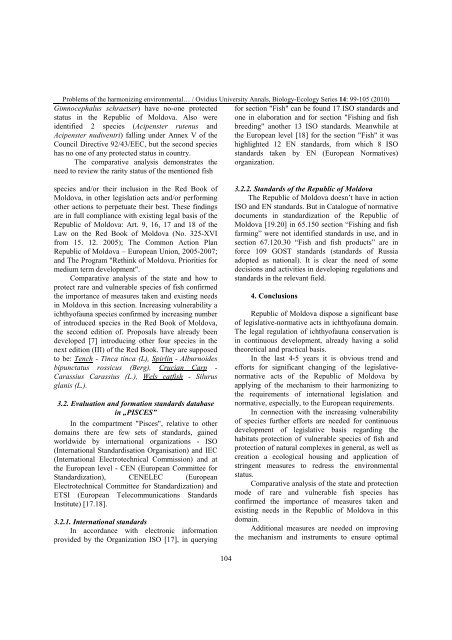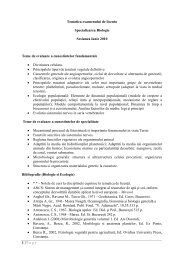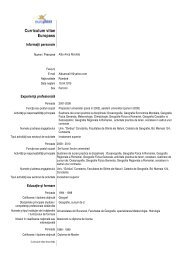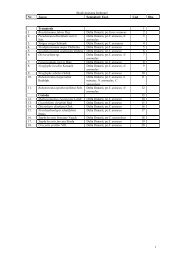VOLUM OMAGIAL - Facultatea de Ştiinţe ale Naturii şi Ştiinţe Agricole
VOLUM OMAGIAL - Facultatea de Ştiinţe ale Naturii şi Ştiinţe Agricole
VOLUM OMAGIAL - Facultatea de Ştiinţe ale Naturii şi Ştiinţe Agricole
You also want an ePaper? Increase the reach of your titles
YUMPU automatically turns print PDFs into web optimized ePapers that Google loves.
Problems of the harmonizing environmental… / Ovidius University Annals, Biology-Ecology Series 14: 99-105 (2010)<br />
Gimnocephalus schraetser) have no-one protected<br />
status in the Republic of Moldova. Also were<br />
i<strong>de</strong>ntified 2 species (Acipenster rutenus and<br />
Acipenster nudiventri) falling un<strong>de</strong>r Annex V of the<br />
Council Directive 92/43/EEC, but the second species<br />
has no one of any protected status in country.<br />
The comparative analysis <strong>de</strong>monstrates the<br />
need to review the rarity status of the mentioned fish<br />
species and/or their inclusion in the Red Book of<br />
Moldova, in other legislation acts and/or performing<br />
other actions to perpetuate their best. These findings<br />
are in full compliance with existing legal basis of the<br />
Republic of Moldova: Art. 9, 16, 17 and 18 of the<br />
Law on the Red Book of Moldova (No. 325-XVI<br />
from 15. 12. 2005); The Common Action Plan<br />
Republic of Moldova – European Union, 2005-2007;<br />
and The Program "Rethink of Moldova. Priorities for<br />
medium term <strong>de</strong>velopment".<br />
Comparative analysis of the state and how to<br />
protect rare and vulnerable species of fish confirmed<br />
the importance of measures taken and existing needs<br />
in Moldova in this section. Increasing vulnerability a<br />
ichthyofauna species confirmed by increasing number<br />
of introduced species in the Red Book of Moldova,<br />
the second edition of. Proposals have already been<br />
<strong>de</strong>veloped [7] introducing other four species in the<br />
next edition (III) of the Red Book. They are supposed<br />
to be: Tench - Tinca tinca (L), Spirlin - Alburnoi<strong>de</strong>s<br />
bipunctatus rossicus (Berg), Crucian Carp -<br />
Carassius Carassius (L.), Wels catfish - Silurus<br />
glanis (L.).<br />
3.2. Evaluation and formation standards database<br />
in „PISCES”<br />
In the compartment "Pisces", relative to other<br />
domains there are few sets of standards, gained<br />
worldwi<strong>de</strong> by international organizations - ISO<br />
(International Standardisation Organisation) and IEC<br />
(International Electrotechnical Commission) and at<br />
the European level - CEN (European Committee for<br />
Standardization), CENELEC (European<br />
Electrotechnical Committee for Standardization) and<br />
ETSI (European Telecommunications Standards<br />
Institute) [17.18].<br />
3.2.1. International standards<br />
In accordance with electronic information<br />
provi<strong>de</strong>d by the Organization ISO [17], in querying<br />
104<br />
for section "Fish" can be found 17 ISO standards and<br />
one in elaboration and for section "Fishing and fish<br />
breeding" another 13 ISO standards. Meanwhile at<br />
the European level [18] for the section "Fish" it was<br />
highlighted 12 EN standards, from which 8 ISO<br />
standards taken by EN (European Normatives)<br />
organization.<br />
3.2.2. Standards of the Republic of Moldova<br />
The Republic of Moldova doesn’t have in action<br />
ISO and EN standards. But in Catalogue of normative<br />
documents in standardization of the Republic of<br />
Moldova [19.20] in 65.150 section “Fishing and fish<br />
farming” were not i<strong>de</strong>ntified standards in use, and in<br />
section 67.120.30 “Fish and fish products” are in<br />
force 109 GOST standards (standards of Russia<br />
adopted as national). It is clear the need of some<br />
<strong>de</strong>cisions and activities in <strong>de</strong>veloping regulations and<br />
standards in the relevant field.<br />
4. Conclusions<br />
Republic of Moldova dispose a significant base<br />
of legislative-normative acts in ichthyofauna domain.<br />
The legal regulation of ichthyofauna conservation is<br />
in continuous <strong>de</strong>velopment, already having a solid<br />
theoretical and practical basis.<br />
In the last 4-5 years it is obvious trend and<br />
efforts for significant changing of the legislativenormative<br />
acts of the Republic of Moldova by<br />
applying of the mechanism to their harmonizing to<br />
the requirements of international legislation and<br />
normative, especially, to the European requirements.<br />
In connection with the increasing vulnerability<br />
of species further efforts are nee<strong>de</strong>d for continuous<br />
<strong>de</strong>velopment of legislative basis regarding the<br />
habitats protection of vulnerable species of fish and<br />
protection of natural complexes in general, as well as<br />
creation a ecological housing and application of<br />
stringent measures to redress the environmental<br />
status.<br />
Comparative analysis of the state and protection<br />
mo<strong>de</strong> of rare and vulnerable fish species has<br />
confirmed the importance of measures taken and<br />
existing needs in the Republic of Moldova in this<br />
domain.<br />
Additional measures are nee<strong>de</strong>d on improving<br />
the mechanism and instruments to ensure optimal





